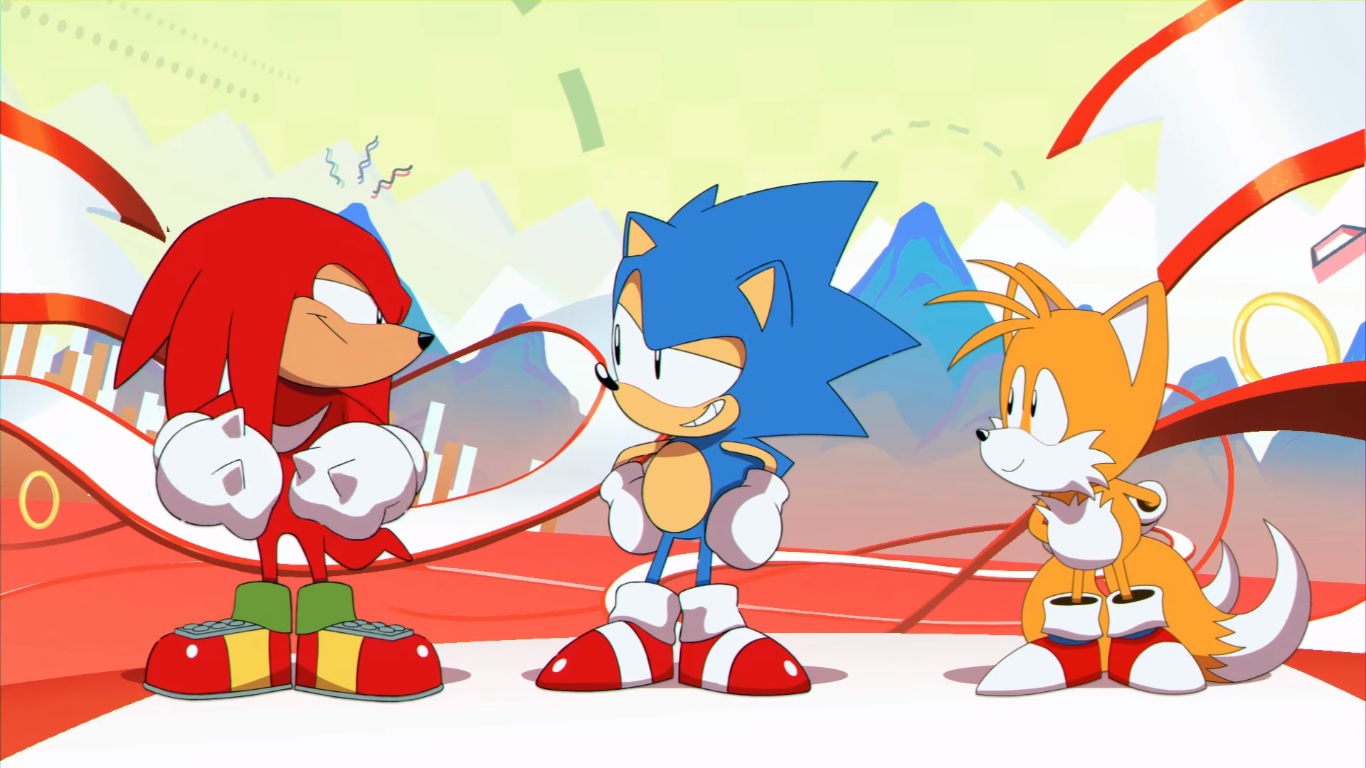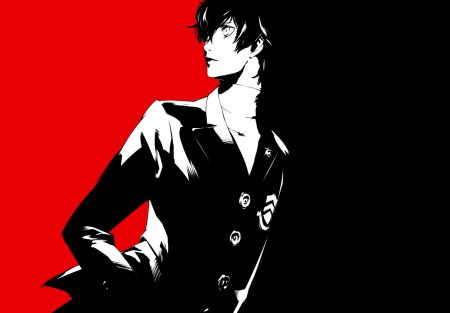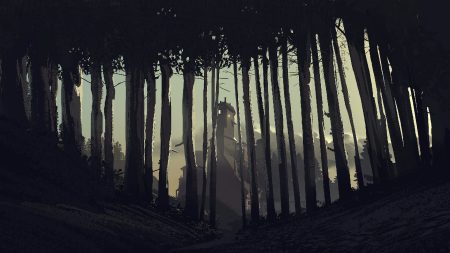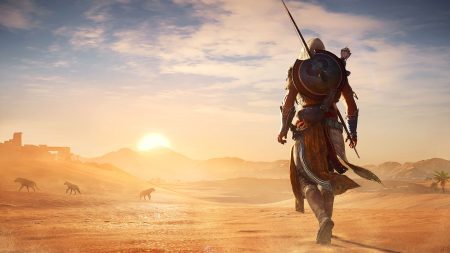Our Industry-Specific Winners (And Loser) of 2017
We kick off our Best of 2017 feature with our Industry Awards.
On New Year’s Eve, The Punished Backlog revealed its nominees for the best games of 2017. While the clock has since struck 2018, we felt it’s important to take a look back on the biggest stories in the games industry in 2017 (for better or for worse).
From the most surprising story of 2017 to the year’s most disappointing one, the following awards highlight the triumphs of game development as well as the roadblocks that inhibit even the biggest of blockbusters. AAA, indie, and everything in-between, here are our Industry Award winners.
Most Improved Player (Winner) – Assassin’s Creed: Origins

If you’re a fan of the Assassin’s Creed franchise, then 2016 was an interesting year. Coming off the heels of several less than stellar, and in some cases (cough Unity) awful releases, the Assassin’s Creed franchise was put on an extended delay. Ubisoft made the surprising decision to hold off on releasing their next main installment in the AC franchise for another year, marking the first time that they had not released an Assassin’s Creed game annually. (They did release a couple installments in the Assassin’s Creed Chronicles series but really, does anyone play that?) With the next release being pushed to 2017, many hoped this would indicate a change in the game’s direction. Both Rogue and Unity, the franchise’s 2014 releases for the seventh and eighth generation consoles respectively, were poorly received, and though Syndicate (2015) was generally regarded as an improvement, there was still much to be desired. Simply put, Assassin’s Creed was starting to plateau.
But now, in 2017, Ubisoft has delivered to their fans. Assassin’s Creed: Origins is a rousing success, improving upon the failures of past games while also boldly taking the franchise in an exciting new direction. The setting of Ancient Egypt is one of the boldest choices made, but it delivers with a bang. It is an absolutely beautiful landscape that stretches further than any previous map in the franchise. The combat, once considered archaic, was revamped to add more difficulty and nuance, and it has evolved beyond simple button mashing. The story, always a strong point in Assassin’s Creed, is arguably the best to date in the franchise. Bayek is a complex, emotional protagonist who has an intensity and drive unlike any other in the franchise, and he joins the likes of Ezio and Edward Kenway in top-tier AC protagonists.
Yes, there are still those boring trailing/following missions, and the overall style of gameplay is frankly still quite similar to years past. But the experience of playing Assassin’s Creed has grown tremendously with the release of Origins, becoming a truly immersive experience. It is undoubtedly the best AC release since Black Flag and that makes it this year’s Most Improved Player.
–Jack Linnehan
Least Valuable Player (Winner) – Star Wars Battlefront II

I don’t know how to objectively measure this, but I know that the original Star Wars: Battlefront and its 2004 sequel, Star Wars: Battlefront 2, are very beloved games. Naturally, when it was announced that the Battlefront franchise was making a comeback, gamers and Star Wars fans rejoiced, though there was the ever-present trepidation of corporate EA hanging over the proceedings. Star Wars Battlefront (note the lack of a colon) released in 2015 to…good enough reviews. It was criticized for several major issues, namely the severe trade-off of depth over accessibility and the paucity of content (no Galactic Conquest?), although it did nail the visual details of the Star Wars universe. A 73 on Metacritic isn’t ideal, but it’s nothing a good sequel can’t fix.
Then the monetization controversies began. I’m sure everyone has heard it all by now—40 hours to unlock a single hero, needing those 40 hours even if you bought the $80 Deluxe Edition, and the now infamous comment positing that unlocking characters was supposed to “provide players with a sense of pride and accomplishment.” EA disabled microtransactions (temporarily) the day before release, but by then the damage had been done. While EA has still done very well, both in 2017 and over the past several years, the loot-box controversy caused their share price to dip over 8% over the course of November. And Battlefront II released to a 68 on Metacritic, which is embarrassing for a franchise of Star Wars’ caliber (and a developer of DICE’s caliber, as well). It was a nightmare scenario for, frankly, everybody.
2017 was a year riddled by controversies over loot boxes, starting with Shadow of War and systemically moving to Overwatch, Paladins, Battlefront II, and Destiny 2, but no singular game was more representative of this issue than Battlefront II (although Destiny 2 really tried to make a late push for it. A heroic effort by Bungie). And for that, Star Wars: Battlefront II is The Punished Backlog’s Least Valuable Player for 2017.
–Kei Isobe
Biggest Surprise (Winner) – Sonic Mania Causes Sonic Mania

As a franchise, Sonic the Hedgehog took some interesting (i.e. bad) detours over the past two decades and has rarely emerged with anything that compelling since Sonic Adventure 2: Battle. The series has somehow managed to cling to relevance despite its numerous failures, and it seemed destined to fade away into oblivion like nearly all of Mario’s cartoon competitors from the 1990s. That is, until Mania’s release this past summer.
Lo and behold, Sega managed to redeem itself for its past disgraces in 2017 with Sonic Mania, a 2D platformer akin to the franchise’s original Genesis games. Sonic Mania somehow shone through in a year teeming with tremendous video games, and not for its ingenuity or unique take on the series, but for returning to its roots: great 2D controls, complex but clever level design, and a remarkable soundtrack.
Game director Christian Whitehead, who gained notoriety from his Sonic fan games, built a game that was mostly fan service, though it didn’t always feel that way. While many of the game’s levels and worlds were clearly inspired by those found in previous iterations, each has its own character and charm, with unique enemies, environmental puzzles, and secrets in every corner. It may not be the most original platformer ever, but Sonic Mania is a welcome return to form that innovates just barely enough to feel different.
The truth is, if Sonic Mania were merely an average game, it would still be viewed as a success. Sega’s flagship franchise has put its fans through unyielding misery for so long that anything that even marginally resembles the original games would be welcomed with open arms. Somehow, Whitehead elevated this series above that standard, making not just the best Sonic game in decades, but one of the best platformers of 2017. All Sonic Mania had to do was not be terrible, and it ended up being a pure delight.
–Sam Martinelli
Gaming Moment of the Year (Winner) – Fly Baby, Fly: Jumping Off the Great Plateau, The Legend of Zelda: Breath of the Wild

It’s no secret that Breath of the Wild is a great game. Its unparalleled freedom allows players to explore Hyrule at their own pace, in their own direction, in their own way. The Great Plateau makes a compelling case for one of gaming’s greatest (and subtlest) tutorials ever, acting as a small introduction to every major mechanic found in the game: climbing, crafting, runes, shrines, and breakable weapons. However, Breath only truly begins when you make a leap of faith off the Great Plateau and head first into a world of your design. In a game full of incredible set pieces and unique experiences, how can you pick just one as Moment of the Year? Well, how about the moment that starts it all?
Leaping off the Great Plateau is The Punished Backlog’s Gaming Moment of the Year. Everyone has a million and a half Breath of the Wild stories, but jumping off the Great Plateau for the first time may be the only moment everyone shares. It marks the beginning of your adventure, the true start of your story. Armed with only the vaguest suggestion (and a couple of swords), you’re free to explore this jam-packed land in any direction you’d like. Every mountain, lake, and tower you saw off in the distance finally becomes attainable. It’s a start unlike any other we’ve ever experienced. Sailing through the figurative gates of a fully realized Hyrule is a memory no gamer is soon to forget.
Leaping off the Great Plateau represents the start of endless possibilities and (at least) 60 hours of phenomenal gameplay. This simple act has a rich history to it as well. It carries a huge legacy on its back, reminding us of getting your first sword in the original Legend of Zelda. “It’s dangerous to go alone.” “Press X to open your sailcloth.” Once you hit this point, there are no rules or directions—just the adventure you choose. So aim, leap, and begin your personal adventure through Hyrule.
–PJ Manning
Rookie of the Year (Winner) – Horizon: Zero Dawn

Horizon: Zero Dawn is a game that allows you to fight weaponized robot dinosaurs… with a bow. The game’s open-world is gorgeous and expansive, featuring an intriguing mix of old-world structures and technology and the new-world civilizations that have built up around them. You play as Aloy, a headstrong and capable hunter who has spent her life cast out from her tribe for reasons she does not understand. As one can expect from a video-game narrative, it’s not long before she gets roped into saving her world, and she quickly learns that it’s a much more diverse and dangerous place than she ever imagined.
Where Horizon separates itself from the pack in terms of narrative is the sheer depth of the rabbit hole she goes down on her quest to stop the malevolent forces plaguing her homeland. The story of Horizon: Zero Dawn is built upon this premise; as Aloy learns more about the history of her home and the surrounding areas, she begins to understand that the world she is protecting and the evil she has set out to conquer are both deeply misunderstood.
When she’s not experiencing mind-bending revelations, Aloy is usually killing something. Did I mention fighting robot dinosaurs with a bow, yet? The combat in the game is silky smooth and encourages creativity, featuring a wide variety of weapon types and enemy mechanics. In one fight, you might be hiding in the tall grass until you can hijack a patrolling beast and send it off to do the fighting for you. In another, you’re setting electric traps in hope of paralyzing your target long enough to get in for a critical melee strike. Or you’re shooting the sack of fuel on the back of a robo-dino with flaming arrows until it ignites and explodes. This is but a small series of examples of different play styles the game allows for.
Horizon: Zero Dawn also features a photo mode that is deliriously wonderful and perfect for capturing the many stunning views you find atop whatever mountain, robot, or building you’ve just climbed. And, of course, there’s Lance Reddick.
This refreshing take on the open-world adventure genre sold a whopping 3.7 million units since it launched in February, making it the best selling PS4 game of 2017 not featuring “FIFA” or “Call of Duty” in its name. Beyond the strong sales, though, Horizon is both a rock-solid adventure and a bold new beginning for Killzone developer Guerrilla Games, making it the best new IP we played this year. Seriously, you fight a giant robot T-Rex that has a freaking cannon mounted on its back. With a bow. We cannot emphasize this enough.
–Geron Graham
Best Indie Game (Winner) – Doki Doki Literature Club

2017 was a great year for indies, but the year’s best indie was also its weirdest. Doki Doki Literature Club is truly something special. What masquerades as a free, run of the mill dating sim quickly evolves (devolves?) into a psychological horror like no other. The gameplay is simple: click text boxes to woo club members and advance text. But when the game glitches out around you, the music turns erratic, and the characters models turn into waking nightmares, even the act of clicking to progress text boxes turns into an uncertain—and terrifying—act. Don’t believe me? In honor of Doki Doki Literature Club’s numerous nominations for our Best of 2017 Awards, we’ve assembled a playthrough of the game’s second act to give context to some of its more terrifying moments.
This is a game that stays with you. While it has yet to hit the mainstream success it deserves, Doki Doki’s niche community speaks nothing but praise. Its heavy handed, satirical anime tropes play with the genre’s more embarrassing character archetypes while its frank depiction of mental illness breathes a surprising amount of charm and heart into the otherwise terrifying experience. At it’s core, that’s exactly what Doki Doki Literature Club is: an experience.
Doki Doki Literature Club is free right now (because it always is). Grab it off Steam for five hours that will stay with you for the rest of your life. Or, if you’d rather, watch us play it for you (also for free).
–PJ Manning
Congratulations to all of our winners. Agree with our choices? Disagree? Make your voices heard by commenting below!
Be sure to check back in the coming days for the next round of our Best of 2017 coverage: Storytelling and Presentation Awards!





































